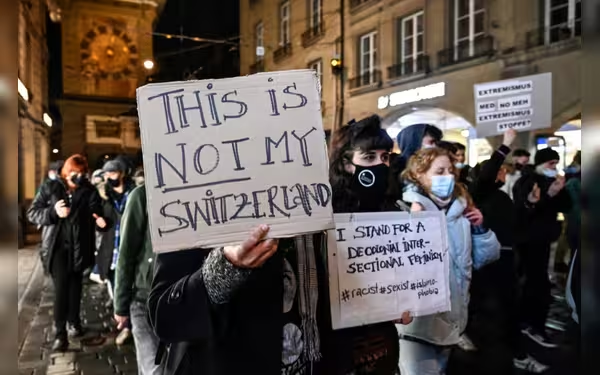Thursday, November 7, 2024 01:37 AM
Switzerland's Burqa Ban Set to Begin in 2025
- Switzerland to enforce facial covering ban from January 2025.
- Critics argue the law infringes on personal freedoms.
- Exceptions allowed for health, culture, and artistic expression.
 Image Credits: arabnewspk
Image Credits: arabnewspkSwitzerland's burqa ban will take effect in 2025, raising concerns over personal freedoms and public safety.
In a significant move that has stirred considerable debate, Switzerland is set to implement a ban on facial coverings in public spaces, commonly referred to as the "burqa ban." This law, which will take effect on January 1, 2025, was narrowly approved during a referendum held in 2021. The decision has drawn sharp criticism from various Muslim organizations, who argue that it infringes on personal freedoms and religious rights.
The origins of this ban can be traced back to a similar initiative in 2009, which prohibited the construction of new minarets. Both measures were spearheaded by the same group, reflecting a growing trend in certain parts of Europe to regulate religious expressions in public life. The Swiss Federal Council, the country's governing body, has stated that anyone who violates this new law could face fines of up to 1,000 Swiss francs, which is approximately $1,144.
However, it is important to note that the ban does not extend to all areas. For instance, individuals will still be allowed to wear facial coverings on airplanes, in diplomatic and consular premises, and within places of worship. Additionally, the government has clarified that facial coverings will be permitted for health and safety reasons, cultural customs, or due to weather conditions. This means that while the law aims to restrict certain types of facial coverings, it does allow for exceptions in specific contexts.
Moreover, the law acknowledges the importance of artistic expression and advertising, permitting facial coverings in these scenarios as well. If someone needs to wear a facial covering for personal protection while exercising their rights to freedom of expression and assembly, they may do so, provided they have received prior approval from the relevant authorities and do not disrupt public order.
This ban raises important questions about the balance between public safety and individual rights. While proponents argue that it enhances security and promotes social cohesion, opponents view it as a discriminatory measure that targets specific communities. As Switzerland prepares to enforce this law, it will be crucial to monitor its impact on social dynamics and the rights of individuals, particularly those from minority backgrounds.
The Swiss "burqa ban" is a reflection of ongoing tensions surrounding cultural identity and public policy in Europe. As societies grapple with issues of integration and freedom, it is essential to foster dialogue that respects both individual rights and collective security. The implementation of this law will undoubtedly be a pivotal moment for Switzerland, and its effects will be closely watched by nations around the world.













